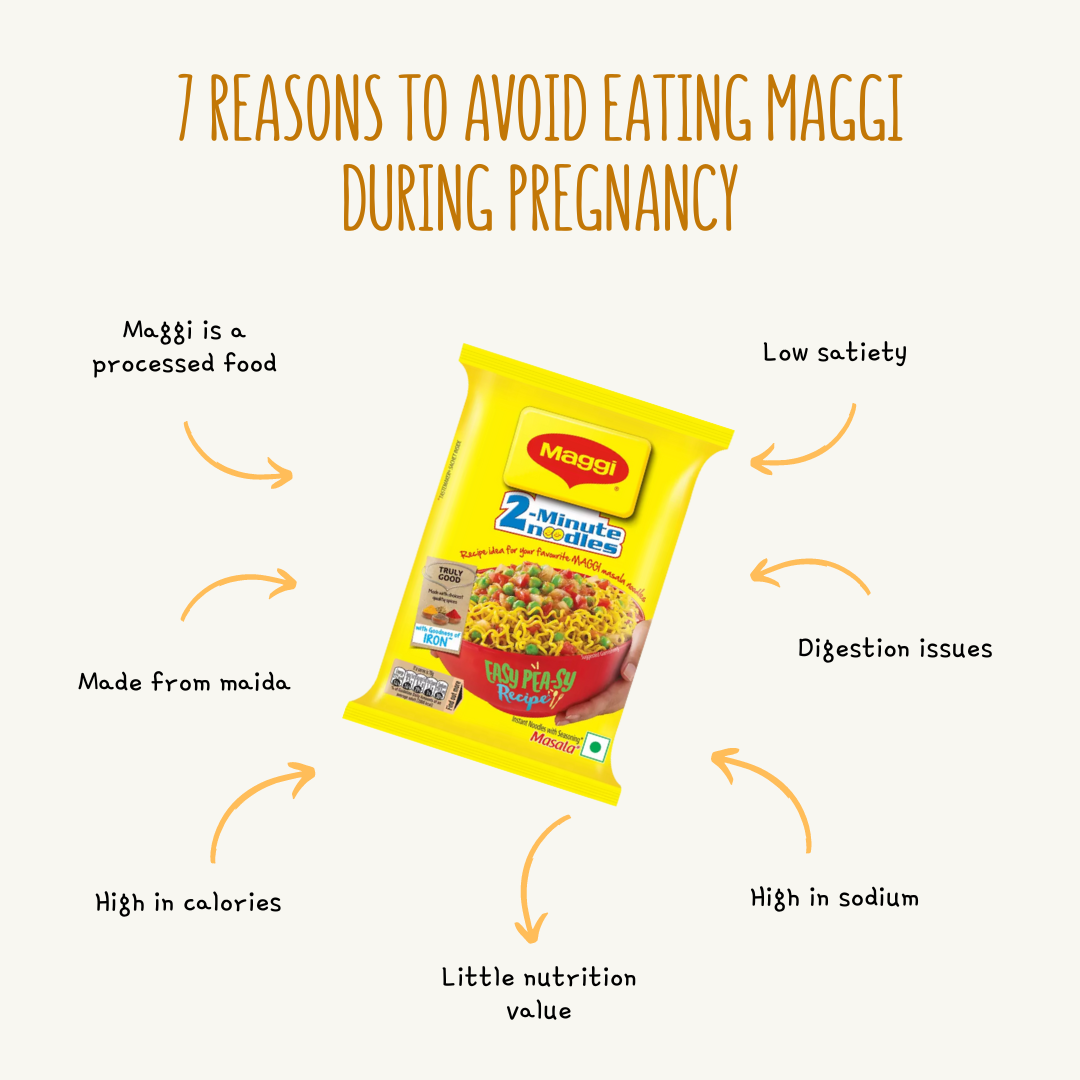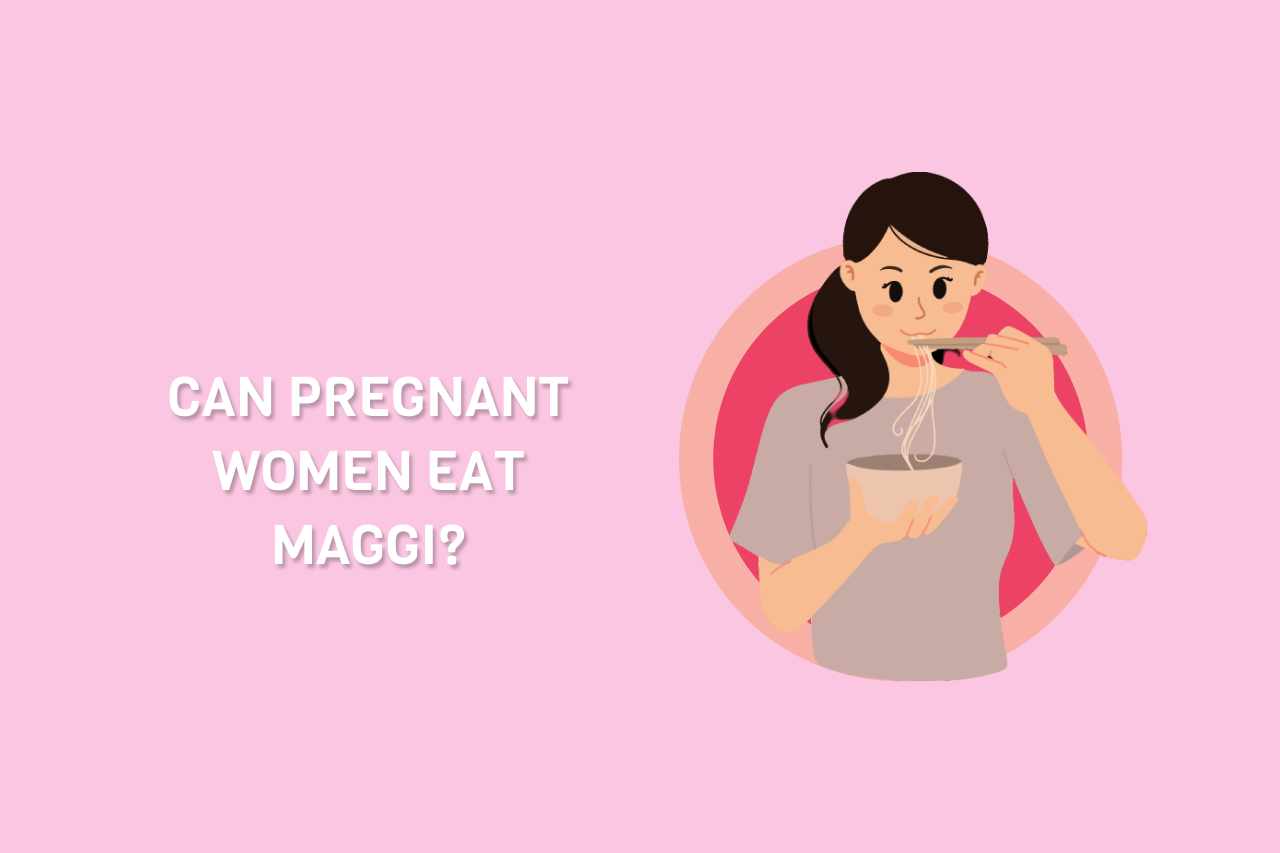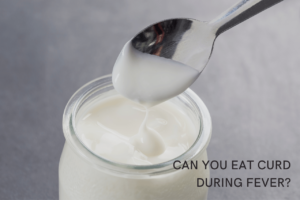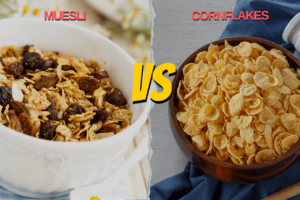Pregnancy is an amazing time in a woman’s life. Your body is going through so many changes, and you are creating a new life. It is a time to be cherished and loved. You are slowly but surely becoming a mother, which is the most beautiful thing in the world.
However, pregnancy comes with so many things to worry about. It’s no wonder that some moms-to-be are unsure about whether they can continue to enjoy their favorite foods.
One common question that many women ask is if they can eat Maggi during pregnancy.
While Maggi is undoubtedly an easy-to-make, cheap and convenient way to get a meal during pregnancy, unfortunately, it’s not nutritious and healthy for you.
In this post, I have listed 5 reasons women shouldn’t eat Maggi during pregnancy. I have also shared some healthier alternatives to Maggi at the end that you can include in your pregnancy.
So let’s begin.
7 Reasons why shouldn’t you eat Maggi during pregnancy

Maggi is a processed food
The best thing a woman can do for her unborn child is to avoid processed foods.
Maggi falls into the processed food category because it’s low in nutrients and high in unhealthy carbs and fats.
As per research, processed foods have low nutritional quality and high energy density. They are also rich in sugar, fat, and salt, which makes them hyper-palatable and causes disruptions in appetite regulation.
A study done at the Women’s Health Center in the USA found that pregnant women who consume excess amounts of processed food are associated with excessive weight gain and an increased risk of developing gestational diabetes.
So, if you’re looking for a healthy pregnancy, it’s best to stick to whole or unprocessed foods.
It is made from maida
Maggi is made with maida, which is a type of refined wheat flour.
While maida may be a staple ingredient in many dishes, it is not considered a healthy food choice, especially for pregnant women.
Maida is made by stripping the wheat of its bran and germ, leaving only the starchy endosperm. This process removes much of the wheat’s natural nutrients and fiber, resulting in a flour that is low in nutritional value.
In addition, maida is typically bleached with chemicals to give it a white color, decreasing its nutritional content.
Furthermore, a study on 918 mothers discovered that a higher intake of refined grains during pregnancy is closely linked to a higher BMI and a greater chance of offspring being overweight or obese at age 7 among women with GDM(gestational diabetes mellitus).
It is high in calories
Calories are undoubtedly important for every individual. And it’s also true that pregnant women need 300 extra calories a day.
But, where these calories come from matters.
Maggi is high in calories, but most of these calories come from unhealthy carbs and fats, which can lead to excess weight gain during pregnancy.
Gaining too much weight can lead to further complications such as gestational diabetes, elevated blood pressure, and complication during birth.
It contains little nutrition value
Pregnancy is a unique time in a woman’s life when her nutritional needs are higher than usual. This is because her body is working hard to support the growing baby.
However, if you choose to eat Maggi during pregnancy, you and your unborn baby won’t be getting all those essential nutrients.
In fact, Maggi has maida as the main ingredient, which is devoid of many essential nutrients.
A single serving of Maggi provides 5.6 grams of protein and 2.5 grams of fiber which is quite low for pregnant women. In addition, it doesn’t contain essential nutrients like folate, calcium, vitamin D, DHA, iodine, etc.
When you don’t get enough nutrients, your growing baby will get the vitamins and minerals it needs from your own body. As a result, this may lead to certain nutrient deficiencies in your body.
It is high in sodium
Salt craving is one of the most common things during pregnancy.
And while salt is an essential mineral for the body, eating too much of it can pose many health risks to you and your baby.
Maggi is high in sodium, containing about 850mg per serving, about 37% of the daily need.
Most pregnant women get enough sodium through their regular diet. Eating Maggi on top of that can elevate their sodium levels resulting in high blood pressure and heart diseases.
Also, as per some recent studies, it is suspected that excessive salt intake is involved in the development of inflammatory processes, which can result in miscarriage, preeclampsia, and adverse pregnancy outcome.
It can cause digestion issues
During pregnancy, it is common for women to experience digestive issues.
This can be due to the increased hormones in the body, which can cause the digestive system to slow down, leading to constipation, gas, and bloating.
Being made from maida, Maggi can be hard to digest during pregnancy and can increase your digestive issues.
Low satiety
While eating Maggi during pregnancy may satisfy your craving, it does not help keep you full and satiated for an extended period.
This is because it is low in nutrients such as fiber. As a result, you may crave more food later.
Can you eat atta or oats Maggi during pregnancy?
Although the label on the pack of oats or atta Maggi may lead you to believe they are healthier alternatives to regular Maggi, it is important to note that oats Maggi only contains 40% oats—the rest is maida and other additives.
Plus, oats Maggi is high in trans fat and has more sodium than regular Maggi, which makes it unhealthy for you.
While choosing Atta Maggi may be slightly healthier for you, it still falls into the category of processed food, which is not good for pregnant women.
If you have a terrible craving for Maggi, you can go with the atta Maggi, but make sure not to consume too much of it.
Healthier alternatives to Maggi during pregnancy
When pregnant, you want to ensure you’re eating healthy and nutritious foods. But sometimes, you just get a craving for something fast and tasty.
If you’re craving Maggi, don’t worry – there are plenty of healthier alternatives you can enjoy. Such as:
- Quinoa
- Oats
- Wheat noodles
- Rice noodles
- Whole wheat Dalia
If you wish, you may also substitute Maggi noodles for a healthier alternative, which I have written a post about.
Top 10 Healthiest Noodles Brands In India in 2022
Final words
Whether you are pregnant women or not, frequently consuming Maggi in place of your main meals is not good for your health.
While ready-to-eat foods are easily available and cook in no time, consuming whole, organic foods over processed foods should be the mantra during pregnancy.
So the next time you crave Maggi, remember that it is not good for you or your baby’s health.






